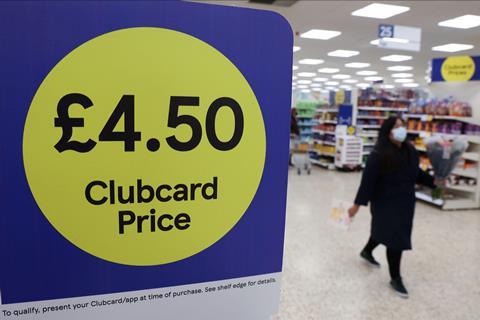Discount supermarket Lidl is fighting Tesco in the High Court over a brightly coloured yellow circle on a blue square claiming trade mark and copyright infringement.
Sitting before Mrs Justice Joanna Smith in the Rolls building in London, the court heard the claim is centred on Tesco’s Clubcard prices promotion which features a yellow circle on top of a blue background to publicise the promotion and, Lidl claims, ‘bears a similarity’ to the budget shop’s logo.
Benet Brandreth KC, for Lidl, told the court that Tesco’s own consumer research saw some respondents describe the Clubcard prices promotion as being akin to Lidl. He said it meant customers would wrongly believe they were buying products at lower prices than they were.
Brandreth said: ‘You can see it from the research Tesco did…research that shows a proportion of consumers making the connection we say is being made. It is sufficient in themselves to justify court intervention.’
Tesco argued that the low number of respondents replying with references to Lidl were more likely referring to Aldi and the Aldi price match promotion as Aldi and Lidl ‘often get grouped together.’
Brandreth added: ‘What we complain about is not primarily origin confusion, it is the link between Clubcard and my client’s reputation. They [customers] are not saying they do not know they are in a Tesco store, they do not think they have magically been transported to a Lidl. This is about the copy that is why we are still here fighting.’

He argued that Lidl’s reputation as a cheaper supermarket would be implied through Tesco’s Clubcard promotion.
Hugo Cuddigan KC, for Tesco, said the Lidl logo was not ‘recognised as significantly artistic’ to be a protected work. He added: ‘It is a circle with a ring on it. That is why we call them kindergarten shapes, there is no artistic [merit].’
Cuddigan added: ‘There is a noticeable omission…my learned friend is unable to articulate a case that the Lidl logo is similar to the Clubcard prices logo. Of course, the Clubcard is immensely well-known and Lidl is immensely well-know [but] they are utterly distinct, they are dissimilar.
‘We do not need to prove confusion. [It is] meant to be hard to establish hence the requirement for change of economic behaviour, my learned friend does not like that, so he does not mention it.’
Two members of the public also gave evidence in court, one who had tweeted that an advert about the Tesco’s Clubcard promotions had reminded him of Lidl while another who had done a ‘comedy double take’ while looking at the Tesco website and emailed Lidl over the branding. Both confirmed the confusion had not put them off shopping at Lidl. Simon Berridge said he thought the similarity was ‘very unfair’ and ‘beyond mimicry.’
Claire Farrant, Lidl marketing director, also gave evidence. Cuddigan took her through some of Lidl’s own products.
He said: ‘Clearly from the Lidl products, they have been copied from the branded product. Lidl copies the look and feel of branded equivalents.’
Mentioning Lidl’s version of Cathedral City cheese named Valley Spire and Lidl’s version of Oreo’s named Neo, Cuddigan put to Farrant that companies ‘spend time and money working on branding’ so that products would be recognisable and ‘that recognition is being directly copied [by Lidl].’
He said: ‘It is Lidl…taking advantage of that recognition by copying those brands.’
Farrant said: ‘They have not been copied. The products are something that is [Lidl] own brand, it is close to but within parameters that are allowed. There is no copying.’
Cuddigan added: ‘Lidl are suspicious of Tesco’s behaviour because that is how they themselves behave.’
Farrant replied: ‘That is not correct.’
The trial continues.
This article is now closed for comment.



























18 Readers' comments